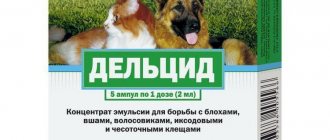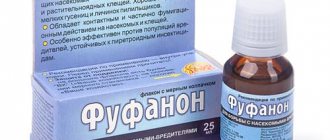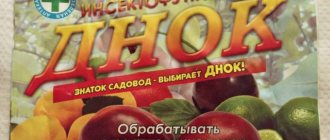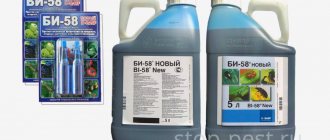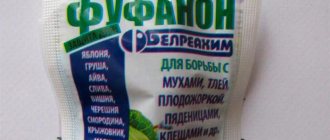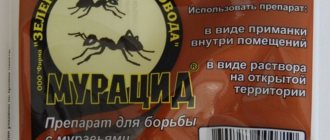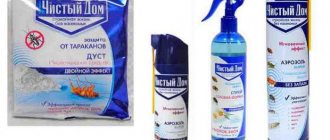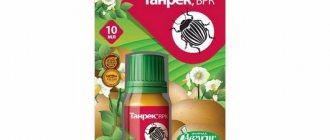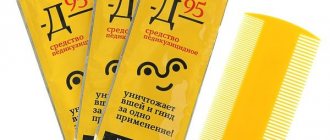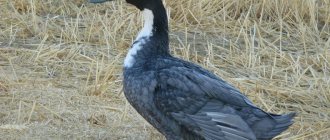Delcid is an effective drug for controlling parasites in chickens. Sold in pet stores and veterinary pharmacies. Available in the form of an emulsion, which is diluted with water. Let's use it as a disinfectant for premises. To achieve maximum effect, you must follow the instructions from the manufacturer. The drug is highly toxic, so when working with it you must follow safety and personal hygiene rules.
For what diseases is Delcid used?
A brief description of:
In Russia, parasitic diseases are widespread, both in livestock and poultry. They cause serious damage to poultry farmers.
Parasites multiply quite quickly, cause exhaustion, and reduce egg productivity.
The drug Delcid has a fairly wide range of indications for use. It is used to kill feather eaters that lay eggs on the bird’s body.
For them, open wounds are the most favorable habitat. Parasites mainly accumulate on the neck, wings, and beak of chickens.
The product is effective against cnemidocosis, during which chickens become infected with feather mites. Birds with this disease behave quite restlessly. They constantly peck at the place where ticks live. Chickens' legs swell and white scabs appear.
The drug is used to treat infectious contagious disease. The causative agents are Pasteurella bacteria, which live in feathers, droppings, and on eggshells.
The product has a detrimental effect on various skin pests:
- lice, fleas;
- ticks from the order Sarcoptidae, Ixodida;
- bedbugs
Deltsid is used for therapy and for the prevention of many parasitic diseases.
Infestation in chickens
Before starting to treat chickens with an insecticidal preparation, the fact of invasion must be confirmed by a veterinarian. External manifestations become obvious only in advanced stages. At the initial stage, ectoparasites manifest themselves differently:
- the bird is nervous, every now and then scratching its feathers with its beak or claws;
- there is a noticeable loss of appetite and weight, anemia;
- egg production decreases.
Chickens become infected with different types of ectoparasites: lice, fleas, mites. If an infestation is suspected, the veterinarian first inspects the bird’s legs, because bloodsuckers nest in open areas.
Lice and fleas do not like open areas; they prefer shelter - down and feathers. The veterinarian lifts the feathers and examines the skin. In an infected chicken, the entire area under the feathers is strewn with dark spots, like freckles or moles.
Ectoparasites of all types, having found a “host”, quickly master and multiply rapidly. If the infestation is clearly established, do not delay treatment with toxic drugs.
Composition and pharmacological action
The product is produced in the form of a concentrated emulsion, which contains deltamethrin. The active substance is a synthetic pyrethroid that causes paralysis and death in external parasites.
Insectoacaricide belongs to moderately dangerous medicinal substances (hazard class 3). When used in recommended doses, it does not irritate the skin of birds and does not exhibit toxic properties.
Delcid emulsion contains neonol, nefras and Tween 80 as excipients.
Routes of infection
The answer to the question of why blackclubs became infected with insects lies in the very nature of the “carrier-parasite” microsystem. An insect that feeds on someone else's blood is driven by the instinct of survival and reproduction, therefore it strives with all its being to find a “master”. Accordingly, the chicken picks up the ectoparasite:
- by interacting with an infected bird;
- after using bedding on which an infected chicken was sitting.
In rarely cleaned and undisinfected, unkempt poultry houses, flea infestation is guaranteed.
The choice of control method depends on which ectoparasites have settled on the laying hens. Both chemical compounds and folk remedies are used against insects. The latter are less effective and will not replace drugs.
Instructions for use
How to use and dilute the solution, dosage.
Deltsid is a Russian-made insectoacaricidal drug. It has gained popularity due to its wide range of effects.
Pets are treated with the drug by bathing, poultry is mainly treated by spraying.
To make an emulsion for these purposes, you need to perform a number of steps:
- Determine the desired consistency, which depends on the number of heads and the area of the room.
- Mix 1 part of the product with two or three volumes of water.
- Pour the prepared solution into a spray bottle.
Along with the treatment of poultry and livestock, the premises are cleaned of pests. In this case, all surfaces are sprayed, starting from the ceiling and ending with the walls and floor.
For chickens
It is best to treat chickens with Delcid in the spring. If the first symptoms of parasites are detected in a bird, the entire population of chickens must be treated.
This must be done so that the midges cannot return. To do this, the chickens should be placed in another place.
Poultry is treated by spraying the feathers or bathing them. With a small number of parasites, manipulation is carried out every two to three days every two weeks.
To carry out preventive measures, a single treatment is enough. The therapeutic suspension should be prepared just before the start of treatment.
To do this, make a solution based on the presence of a certain type of parasite:
| Name | Solution for 10 liters of water |
| Ixodida ticks | 9.5 ml |
| Scabies mites | 12.5 ml |
| Lice, bugs, lice, fleas | 6.2 ml |
Bathing and spraying are best done in dry weather at an air temperature of at least 13 °C. Spraying can be done using a garden sprayer.
It is necessary to moisten the plumage generously and evenly with the prepared mixture.
If swimming is carried out in floating baths, then the duration of the procedure for each bird should be no more than 40-60 seconds.
Features of use for chickens, including broilers:
- Delcid treatment is not recommended for chickens. Due to weak immunity and low weight, the use of an insecticide can lead to the death of chickens.
Features of use for laying hens:
- Laying hens do not require special processing techniques. After the procedure, eggs should not be eaten for the first three days.
Features of use for adult broilers:
- no special processing technique is required. After the procedure, the chicken can be slaughtered two weeks after treatment with delcide.
Can it be used for goslings, turkey poults and other birds?
Ticks and feather eaters bother not only chickens, but also geese, turkeys, guinea fowl, ducks and other types of poultry. Young animals are especially susceptible to parasites.
To process poultry, the working emulsion should be prepared according to the data specified in the instructions. It is better to determine the volume of solution and the amount of drug for preparing a medicinal emulsion under the guidance of a veterinarian.
Important! The information is not a direct guide to action. Treatment should only be carried out by qualified professionals.
Chicken coop treatment rules
To treat a chicken coop with Deltsid, use a more concentrated solution. 37.5 ml of insectoacaricide must be diluted in 10 liters of water. It is recommended to treat the premises in the absence of chickens.
The drug is sprayed on ceilings, walls, nests, perches and all working equipment. Consumption rate per sq. m is 25-50 ml.
An hour after treatment with Deltsid, the chicken coop is ventilated for 60 minutes. Afterwards, the poultry house is cleaned, the feeders and drinkers are thoroughly washed.
At room temperatures up to +20 degrees, re-treatment with the drug is done after 10 days. At higher temperatures, disinfestation is carried out after 5-8 days.
Side effects
The Deltsid instructions indicate that if the proportions in the preparation of the medicinal emulsion are observed, no adverse reactions should occur in animals and poultry.
Before mass use of the drug, it is recommended to treat two or three chickens. If the bird feels normal, you can continue treating the remaining birds.
If the specified dosage of dilution of the drug is not observed, the following symptoms may appear in pets:
- lack of appetite;
- lack of coordination;
- muscle tremors;
- swelling;
- vomit.
If negative signs are detected, you should stop using Delcid. And then it is recommended to carry out therapy aimed at reducing the body’s sensitivity to the drug.
Why are chicken fleas dangerous?
Infection of livestock should never be ignored. Malaise and intoxication, inevitable in the event of an invasion, exhaust the bird; it constantly worries, scratches its feathers, experiencing constant discomfort and nervousness with unbearable itching from the bites. The bird becomes weaker, stops eating, laying eggs, and dies early.
Disinfection and deratization have little meaning if proper sanitary conditions are neglected. It is necessary to destroy rats and mice, to cut off the conditions for their penetration into the chicken coop. Strengthen walls and joints. No cracks, even the slightest, are allowed in baseboards and partitions. Rats pose a serious danger to chickens, especially pullets and chicks.
Contraindications for use
Do not treat birds and animals that are sick or have recently been sick with the drug.
Since the drug affects the nervous system, even a small dose can cause paralysis in a weakened individual.
Deltsid should not be used if you are hypersensitive. It is also not recommended to treat females earlier than two weeks before giving birth.
The product is toxic to fish and bees. Therefore, treatment with the drug cannot be carried out near water bodies and apiaries.
Disposal
Under no circumstances should you pour any remaining Deltsid solution into the toilet. Reviews recommend treating the container in which the working solution was located with soda and soap solution. The remaining product must be completely neutralized with slaked lime and carefully buried in the ground to a depth of at least one meter.
The choice of a high-quality insecticide largely determines the effectiveness of the room treatment procedure. Therefore, you should approach the issue of choosing it with all seriousness. You should mostly focus on reviews from real consumers who had the opportunity to verify in practice the effectiveness of a particular product. This is exactly the case with the drug "Deltsid". Customers describe it as an incredibly effective insecticide that has helped them completely get rid of bugs that were bothering them.
It is important to remember that the maximum effect can be achieved only if you strictly adhere to all recommendations regarding the preparation of the working emulsion, as well as the process of treating the animal or premises. Strict adherence to the instructions contained in the instructions will help to avoid the occurrence of any adverse reactions from the body to exposure to the substance in question.
It is necessary to treat the room as carefully as possible, without missing any surfaces or crevices. It would also be reasonable to spray the rigid frame of upholstered furniture with the product.
It is important to consider that during the first procedure insect eggs can be preserved, which at a certain stage of development have a durable shell that protects them from any, including chemical, external influence. Therefore, experts recommend that after ten to fourteen days an additional disinfestation procedure is carried out, which will destroy newly born parasites.
In this case, the victory over fleas will be final!
Choose the best quality drugs, take care of yourself and your pets!
Compatibility with other drugs
When treating poultry against parasites, the manufacturer does not recommend combining Deltsid with other insectoacaricidal drugs. Since there is a risk of increased toxicity of the active substances.
The manufacturer has not made observations regarding the interaction of the emulsion with other drugs.
However, it does not recommend using the product to treat recently ill birds. Therefore, it is advisable to refrain from using Deltsid while treating chickens for other diseases.
What is a feather eater
The beetle chooses to live in open areas—the lower legs of its host. Externally, the ectoparasite is similar to lice:
- characterized by a narrow and long body;
- reddish-brown color of the outer covers;
- the legs of the insect are set apart and, unlike fleas, are clearly visible even to the naked eye;
- each leg is armed with two mini-anchors, thanks to which the insect moves quickly and does not fall from the carrier.
The ectoparasite lives on all birds, regardless of age. Baths with charcoal, chalk or crushed shells protect birds well from insects.
Personal prevention measures
When working with an insectoacaricidal drug, it is recommended to observe a number of safety measures, for this you need to:
- Wear gloves and a protective mask during disinfection activities;
- Wash your hands after the procedure;
- If the solution gets on your skin, rinse it immediately with water.
- if the drug is ingested, give the victim an absorbent drink with plenty of water;
- slaughter should be carried out 2 weeks after processing.
At the first symptoms of poisoning, you should consult a doctor.
The dishes in which the solution was prepared must be washed with a soda solution and then with soapy water.
Special instructions, storage, price
Before treating mammals or birds with Deltsid, the condition of the patients is assessed: deltamethrin enters the sebaceous glands and is completely removed from there after 2 weeks. Therefore, after processing, meat is unfit for food for 15 days. Psoroptes are localized in the ears of rabbits, so they can be slaughtered for meat 3 days after the end of treatment. Milk obtained by treating a cow against pasture midges is used without restrictions.
Treatment of animals and premises with Deltsid is carried out in special clothing, gloves, goggles and a mask. Persons predisposed to allergies, pregnant women, and nursing mothers should refrain from working with the insectoacaricide.
If a person develops nausea, he needs to swallow 10-15 tablets of activated carbon and drink plenty of water.
The drug is stored for 2 years at a temperature of 0 to 30 °C in places inaccessible to children, separately from food. The cost of a package with 5 ampoules ranges from 170 to 190, a liter bottle from 2200 to 2400 rubles.
Reviews from poultry farmers
Marina:
Deltsid is a good remedy for feather eater and mites in chickens, but only when used in combination. Many people complain that they treated their birds with the product, but after a week the parasites crawled again. Over the course of my ten years of poultry farming practice, I encountered the feather eater twice, and Deltsid helped. I used it like this: I drove the chickens out of the barn, bathed each one in the solution. Meanwhile, the barn was treated with a sulfur bomb, and then sprayed all over with Deltsid. A week later I did the treatment again. With the arrival of spring, the incident with the beetles repeated. I did the pest control again using the same scheme, and for 2 years now the birds have not been bothered by any parasites.
Tamara:
I tried a bunch of remedies for mites on chickens. Nothing helped until a neighbor advised Deltsid. But for the drug to really help, you must carefully treat every corner of the chicken coop. I eliminated all the old litter from the poultry house and sprayed everything thoroughly. The solution was prepared at the rate of 1 ampoule per 1 liter of water. A couple of months have passed, it seems that no living creatures are visible on the bird yet.
Igor:
I used everything to treat the chicken coop against ticks. And Deltsid, praised by everyone, did not help. I had to call sanitation. I spent 11 thousand, and these bastards appeared again 3 months later.
What to do if you smoke a lot
The procedure for getting rid of parasites consists of two stages: first, the laying hens are treated with a poisonous drug, then they are housed.
Ectoparasites use nests, crevices, holes, cracks, accumulated dirt, and litter for shelter; accordingly, these are the places that need special treatment. If this is not done, then all measures taken will have a temporary effect, and re-infection is inevitable.
- The chicken room is sprayed with Karbofos or special concentrated aerosols, such as Get, Cucaracha.
- For a large number of heads, it is recommended to use Dust or Butox. The latter is applied directly to the feathers of the bird (at the rate of 1 ml per four liters of water).
- Disinfectants Raptor and Reid are more expensive, but inferior to Deltsid in terms of effectiveness. These poisons perform well only during the initial stages of invertebrate infection.
Similar publications
Alben for chickens
Apr 23, 2020
Metronidazole for broiler chickens
Apr 17, 2020
Regardless of the number of heads, preparations containing chlorine are unacceptable for use!
To achieve a satisfactory result, you must carefully read the instructions for the drug and follow all its points. Safety standards deserve special attention. The principle “the more the merrier” will not work.
On the contrary, this leads to serious poisoning and even death of the bird. A careless, especially excessive dosage of the drug will cause more harm than the ectoparasite itself.
Diagnosis of the disease
Scientifically, the disease caused by lice eaters is called mallophagosis. It is difficult to detect it at an early stage.
There are two ways to diagnose the presence of mites, lice or lice at home.
Using an initial examination of the bird. First you need to pay attention to the plumage and head. The fluff should be distributed evenly and there should be no bald spots on the body.
You also need to examine your eyes. The chicken should not have suppuration, tearing, or crusts in the eye sockets.
The second way: observe the behavior of chickens. Pay attention to how often birds scratch their bodies. Are the other symptoms listed above present? The chicken should behave calmly and eat well.
